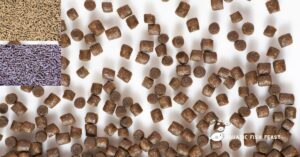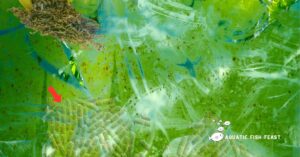Do you want to know how long does fish food last? Yes, I want to know how long fish food lasts. Those unfamiliar with the sport might assume that keeping fish is cheap, but there are significant ongoing expenses associated with doing so.
Among the things you’ll need to consistently purchase is fish food. Many aquarists know that buying in bulk is the most cost-effective method to purchase fish food, but is there any danger of the fish food expiring if bought in such large quantities?
Fish food may be stored for two to three months over its expiration date if kept dry. Exercise caution since the diminished nutritional value of the meal is bad for your fish. It is also crucial to understand how to properly preserve the food.
Now, let’s get started.
Table of Contents
How Long Does Fish Food Last
There has recently been a lot of discussion online over whether fish food lasts past its expiration date.
However, this is mostly a matter of personal choice. Some aquarists are content to use their food far past the expiration date, while others are rigid and will discard the food as soon as it arrives.
One of the most significant issues with utilizing fish food after its opening is that it begins to lose a significant amount of its nutritious content.
These prepackaged foods are intended to provide fish with all they require to survive, and while expired food may feed their tummies, it will do nothing else. However, getting to this position takes some time.
Most people believe you should use fish food within six months after opening it, although others may store it for up to a year.
Storing the foot appropriately is one of the greatest methods to extend its life since it prevents it from being subjected to temperature variations, excessive light, and moisture. However, we shall go into storage in greater depth later.
Most people regard the expiry date on a packet of fish meal as more of a recommendation than biblical truth.
We wouldn’t recommend using an open packet after this date but for sealed packages, opening and using them after the expiry date should be fine.
Of course, there comes a moment when you have to confess defeat, so if you open the food more than three months over the expiry date, we recommend throwing it out and buying some more.
You may have all the willpower in the world and conduct all the research you want, but the best method to determine whether fish food is still in excellent condition is to inspect it.
Visual cues like mold and degeneration will inform you whether it’s safe to put in your tank. Furthermore, if the meal shows any symptoms of wetness, it is generally preferable to reject it.
Another issue amateur aquarists confront with fish food is that unsealed packages might appeal to insects and mites. If there is any indication of their presence, discard the packet and start a fresh one immediately.
How To Keep Fish Food Fresh For Longer Periods
The freshness of pellet-based meals may be helped to be maintained by using airtight containers that can be screwed on firmly or fitted on snugly, zip lock bags, and the storage of the food in cold, dark areas that are free of moisture.
A smart action plan also includes making a mental note to always ensure that the container lid is securely fastened after every feeding.
Zip-lock bags are the most effective way to store frozen meals like bloodworm cubes and other items. It is best to do so when feeding frozen items on or before the expiration date or shortly afterward.
In the case of foods prepared at home, a good rule of thumb to follow is to consume the food within two weeks of its preparation, presuming that it has been frozen rather than just chilled.
Can Silica Packets Ensure Fish Food Stays Fresh For Longer Periods
Before sealing the food packets and shipping them out to customers, most fish food producers include one silica packet in each meal packet.
This is done to guarantee that the food has a longer shelf life and that it does not become rotten before it expires.
If the silica packets are still sealed and unbroken, the answer is yes; you may use these to keep the fish food from being overly saturated with moisture.
You may also purchase silica gel packets on your own, enabling you to keep the fish food you buy in bulk fresh for a significantly longer time. Adding one to two extra silica packets for every two pounds of fish food should do the trick.
It is important to remember that silica packets can only be used to store meals of the pellet variety, not frozen foods, bloodworms, or other meaty delicacies.
Extracts of garlic can be added to frozen meals to extend the shelf life of handmade frozen dishes that have been frozen.
How Can I Make My Fish Food Last Longer
Here are some ideas for extending the life of fish food:
1. Keep it in a cool, dark place.
Keep your fish food in a cool, dark spot away from any sources of moisture to extend its life. This applies both to unsealed fish food and to food that is still sealed. It also applies to frozen and dry fish food.
Light and temperature, in addition to water and oxygen, have a part in the degradation of your fish food. They will last longer if you store your packs of fish food well-sealed in a cold, dry, darkish closet.
2. Freeze any food not consumed within a few months.
Because economical food cans of dry fish food are frequently available in greater amounts, some fishkeepers dump a portion of the package directly into ziplock bags for freezing.
That way, customers may serve the first portion of the pack to their fish while it’s still fresh, knowing that the remainder of the food is nearly as good as new in the freezer!
If you choose to use this approach, fully seal your food bags, as any moisture entering your dried goods will cause them to decay rapidly once thawed.
3. Purchase High-Quality Fish Food
The quality and packaging of commercial fish feeds vary greatly.
Choose vacuum-packed, nitrogen-packed, or canned goods for the greatest shelf life. At the absolute least, the bag or container you purchase your fish food must have an airtight seal.
How Can You Tell That Fish Food Is Expired
You can detect whether fish food has expired by searching for certain indicators. If the food is discolored, it may have deteriorated.
Mold development is another warning indicator. A foul odor or taste (as seen by fish avoiding it) also indicates that the meal should be discarded.
Here are several indicators:
1. It begins to lose color.
Every commercially available high-quality fish feed has a distinct color. The color of the food reflects how fresh it is, and it should seem appealing to fish. As a result, people should be tempted to consume it. However, after the deadline has passed, the color begins to fade.
When the food becomes faded and strange-looking, it is time to stop feeding it to your fish.
Food retains its nutritious worthwhile it is in its natural color. When it fades, the food’s advantages begin to diminish swiftly.
So keep an eye on the expiry date because the food may not be fully rotten, but it does not remain the same.
2. – It demonstrates mold growth
When the package is unsealed, fungi enter it with the moisture in the air, resulting in mold formation. Your fish may become ill if they take this molded meal.
The infiltration of germs and fungus into packaging is primarily caused by human error, causing the food to get moist and lose nutritional value. After the due date, the fish-feeding items may become more exposed to the water.
As a result, if you see the food becoming clumpy and soggy, check the expiry date on the box and replace it with fresh stock.
It is one of the most prominent indicators of food expiry. As a result, it is advised that all fish food consumers maintain the food away from moisture and store it in dark conditions.
3. – It doesn’t taste very good.
We may detect how our packaged food changes taste after expiration based on our experiences. The same is true for fish food.
4. – A foul odor emanates from the package
If you come across expired fish food, it will emit a terrible odor. The look might appear quite normal at times, but it smells.
Fish feed doesn’t smell great in the first place, so imagine how bad it may smell after it’s expired. Even if the food hasn’t reached its expiration date, always smell it.
How To Save Fish Food After Expiry
There are some professional tips for saving food. In this manner, you can utilize fish feed after it has expired without risk.
The food item is still in good shape, and you may use it for longer. Some individuals continue to use the outdated feed after three months.
The ways are advantageous, and they are as follows: freeze fish food, dry food items, preserve food, and add silicon:
1. Put fish food in the freezer.
Keeping the fish feed in the freezer increases its survival potential. The fish’s diet does not influence the expiration date under this circumstance.
After eight to twelve months, few individuals use their fish fees. Refrigerators maintain certain temperature settings, and the nutrients remain intact within the container.
You may place the feed straight in the freezer or replace the container. Inside the refrigerators, people like to use zip bags with tight closures.
2. Allow the food to dry
In the case of fish food, drying does not imply using any dryers. Keep the containers sealed at all times to prevent moisture from getting inside. Use zip locks on packets and tighten them after use.
Never place the package near a natural or other source of water. Place the packages in a temperature-controlled environment. The temperature restrictions for the feed are specified on the commercial labeling.
3. Store fish food
One of the finest approaches for long-term advantages is the preservation of fish feed. After you’ve opened the packet, never reseal it. When storing feed, always use glass containers or other materials.
Tighten the upper surface with airtight caps to keep the feed safe after expiry. The meal does not alter color or texture. The airtight lids never allow natural air to enter the containers. It shields the feed from odor.
4. Include silicon
Several businesses include microscopic silicon packets in fish feed. Because silicon absorbs humidity, it protects the food from moisture.
What Does The Expiration Date Of Fish Food Mean
The “best used by” date printed on fish food packages is a reference for determining how fresh and nutritious the food is. Freeze-dried foods might lose their nutritional value over time.
After opening the package of dried food, it is preferable to use the contents of the container within the next six months.
When using foods close to their expiration date, giving your dog extra meals, like live or frozen foods, can ensure they get all the nutrients they need for good health.
Remember that the moment you open the container containing the fish food, air, and moisture begins to deteriorate the meal.
It causes vitamin C to be lost. Nutritionally speaking, it turns into the same thing as junk food after a certain amount of time.
There is a chance that your food will get mushy, stinky, or infested with insects. It’s already in a horrible state if any of these things take place. Just toss it out.
As a general guideline, you should periodically replenish the food you provide your fish, such as once every six months.
Can You Refrigerate Fish Food
To answer your question in a nutshell, yes, you can. Do not put more fish food in the freezer if you have purchased more fish food.
Fish food should be kept at room temperature. The proper storage temperature for fish food is room temperature.
Because of this, its nutrients may become less effective over time. Please keep it in the refrigerator to keep it fresh for as long as possible.
If the food has been sitting about for a while, it may have an odd flavor or seem fuzzy on the outside.
Either the hue or the consistency will change. Fish can become ill if they are fed food that has gone rotten and are then forced to consume it.
They are better off going without food for a few days until they get some fresh food rather than consuming anything that may potentially damage them.
They should go without food rather than ingest something that could harm them. If the food has gone bad, you will be expected to throw it away.
As a stopgap measure, you could give them a piece of fruit or green lettuce to hold them over until the main meal is ready. If you brought it, they would like some sliced watermelon, blueberries, or zucchini.
Final Thought
Now that we have established how long does fish food last, As a fish lover and keeper, you must keep your fish healthy. Fish provide color to your life and are a terrific buddy or partner.
As a result, you should take great care of your companion. Correct feeding is one of the most important aspects of keeping your fish healthy.
When feeding your fish, you need to consider many key variables. You should choose appropriate foods based on your nutrient requirements.




